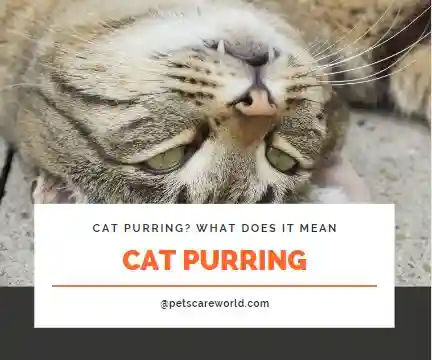In this article, we looks into why cats purr. We love cats and did lots of research to explain why they purr and the reasons behind it. Also included Cat Purring Sound, and answering your most frequently asked questions. So lets dive in.
What does Cat Purring mean?
Purring is a unique vocalization that cats produce, but have you ever wondered how they do it? This section explores the mechanics behind the purring process. Cats have a specialized neural oscillator in their brain, which signals the muscles of the larynx and the diaphragm to vibrate rapidly. This vibration occurs at a frequency of 25 to 150 Hertz and is responsible for the familiar, comforting purring sound that we all adore.
Cat Purring Sound
Cat Purring Why? The Multiple Purposes of Cats Purring
Contrary to popular belief, purring is not just an expression of contentment. Cats use purring as a versatile form of communication, and here are some of the reasons behind their purring behavior:

- Communication and Bonding: Purring serves as a means of communication between mother cats and their kittens. Kittens are born blind and deaf, and they use the vibrations of their mother’s purring to locate her and establish a bond. Similarly, adult cats often purr to convey their affection and create a sense of security with their human companions.
- Self-Healing Abilities: Remarkably, cats’ purring is known to have therapeutic effects. The low-frequency vibrations at which they purr have been linked to the healing of bones, tendons, and muscles. Furthermore, the act of purring releases endorphins, promoting relaxation and reducing stress, both for the cat and its owner.
- Stress Relief: Cats often purr when they are stressed or anxious, using this self-soothing mechanism to cope with various situations. The act of purring can help lower their heart rate and create a calming effect, allowing them to deal with stressful events more effectively.
Cat Purring What Does It Mean: Environmental Triggers
Understanding the stimuli that prompt a cat to purr is crucial to fully comprehending their behavior. Several environmental factors can trigger a cat’s purring, and we explore them here:
- Affection and Attention: Cats are known to purr when they seek attention or affection from their owners. Whether it’s a gentle pat or a warm embrace, the soothing vibrations of purring often accompany moments of closeness and bonding.
- Comfort and Security: Cats may purr when they feel safe and comfortable in their surroundings. This behavior is particularly evident when they are curled up in their favorite spot or resting peacefully on their owner’s lap.
- Healing and Recovery: As mentioned earlier, purring has healing properties, and cats instinctively purr when they are injured or unwell. The vibrations of purring not only help them feel better but also promote a faster recovery.
The Connection Between Cat Purring and Emotions
In this section, we explore the emotional aspect of purring and how it reflects a cat’s feelings and mood.
- Happiness and Contentment: Purring is often associated with happiness and contentment in cats. When a cat is relaxed and content, they may express their joy through purring as a way of communicating their positive emotions.
- Anxiety and Fear: Interestingly, cats may also purr when they are anxious or afraid. This behavior serves as a coping mechanism, helping them calm down and alleviate stress during distressing situations.
- Communication and Social Bonding: Purring plays a crucial role in feline social bonding. When cats purr around each other, it creates a sense of harmony within their group and helps establish a friendly atmosphere.
Can a cat’s purring benefit humans?
Yes, a cat’s purring can have therapeutic benefits for humans as well. The low-frequency vibrations of purring have been associated with reduced stress, anxiety, and even lower blood pressure. Many cat owners find the sound of their cat’s purring comforting and relaxing.
Do cats only purr when interacting with humans?
No, cats may purr when interacting with humans, other animals, or even when they are alone. Purring can be a way for cats to self-soothe and comfort themselves, regardless of their surroundings.
How can I encourage my cat to purr?
Creating a calm and secure environment for your cat can encourage them to purr. Offering gentle affection, spending quality time together, and providing a comfortable resting place can all contribute to your cat’s likelihood of purring.
Are there any health benefits associated with a cat’s purring?
Yes, besides promoting relaxation, a cat’s purring is believed to aid in healing. The vibrations produced during purring have been shown to have a positive effect on bone density and can aid in the recovery of various injuries and ailments.
Are there any specific breeds that purr more than others?
While most cats purr, some breeds are known for being more vocal and purr more frequently. For example, the Siamese and Ragdoll breeds are often regarded as more talkative and may purr more compared to other breeds.
Conclusion
A cat’s purring is complex, expressing different feelings and serving various purposes. It communicates, heals, and holds a special spot in cat owners’ hearts globally. Knowing the science behind it strengthens our bond with these mysterious creatures and helps us take better care of them.
Frequently Asked Questions (FAQs)
Why do cats purr?
Cats purr for various reasons, including communication, bonding, self-healing, and stress relief. Purring helps them convey their emotions, seek comfort, and establish connections with their human companions and fellow feline friends.
Do all cats purr?
Yes, most domestic cats purr. Purring is a common vocalization among cats and is observed in many different breeds and ages. However, some cats may purr more loudly or frequently than others.
Can cats purr when they are in pain?
Yes, cats may purr when they are in pain or distress. Purring is believed to have self-healing properties and can help cats cope with discomfort. If your cat is purring excessively and appears unwell, it’s essential to consult a veterinarian for proper evaluation and care.
Is purring only a sign of happiness?
No, purring is not limited to expressing happiness or contentment. Cats may also purr when they are anxious, afraid, or seeking attention. Understanding the context and other body language of the cat can help decipher the reason behind their purring.
Can cats purr while they are sleeping?
Yes, cats can purr while sleeping. Purring is an instinctive behavior that can occur during various states, including restful sleep. If your cat purrs while sleeping, it may indicate they feel safe and comfortable.






